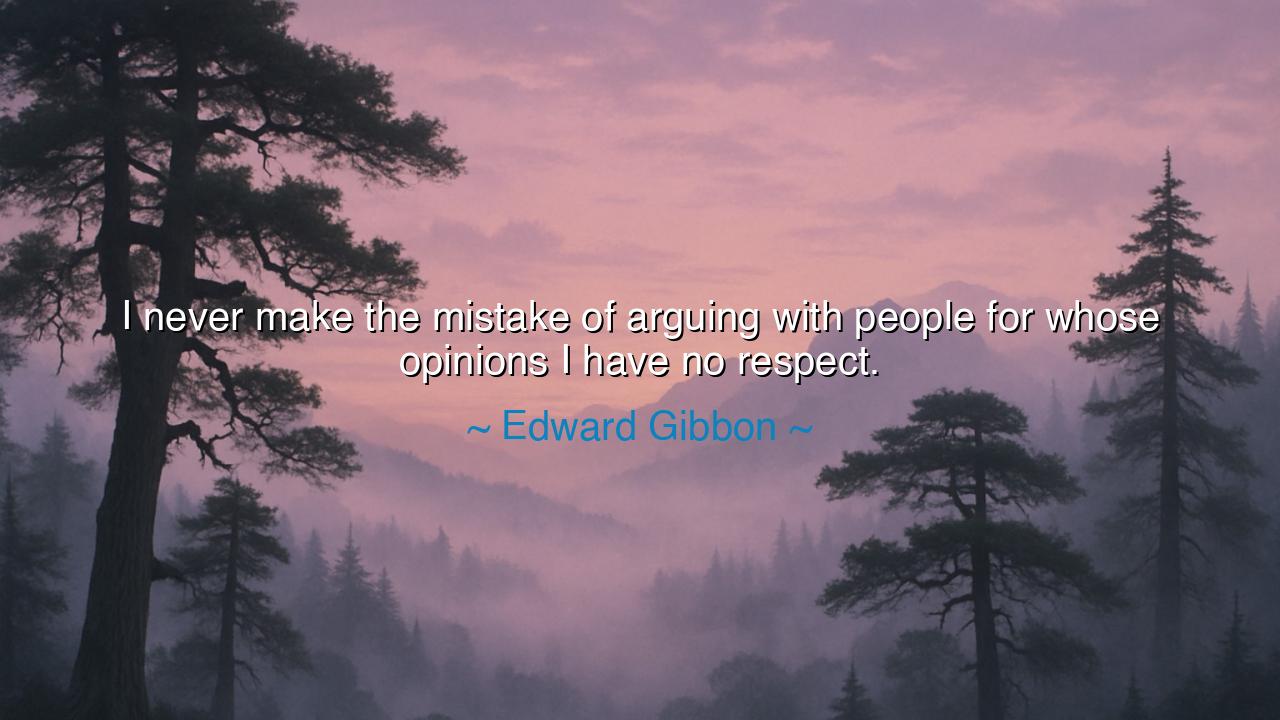
I never make the mistake of arguing with people for whose






"I never make the mistake of arguing with people for whose opinions I have no respect." – Edward Gibbon. This utterance, brimming with the wisdom of ages, speaks not only to the value of our time but also to the depth of our convictions. It is a declaration of self-respect, a proclamation that one should not squander precious moments in fruitless debates with those whose views are unworthy of consideration. Gibbon, a historian of vast repute, reminds us that to engage in such arguments is to lower oneself, to allow the winds of baseless opinion to erode the fortress of our own thoughts.
The great philosopher Socrates, wise beyond measure, understood this principle well. He did not waste his time with those who were deaf to reason or blind to truth. His dialogues, rich with the pursuit of knowledge, were never aimed at those who sought merely to provoke, but rather at those who were open to growth and self-examination. Respect for wisdom and understanding was the cornerstone upon which he built his conversations, and with this, he forged a legacy that has endured for millennia. Socrates knew that the true value of an argument lies not in winning, but in the exchange of ideas with those worthy of engagement.
In the ancient courts of Rome, the greatest orators were known not for their willingness to argue with every passerby, but for their ability to discern who deserved their rhetorical prowess. Cicero, perhaps the most skilled of all Roman orators, often chose his battles carefully, knowing that words, once spoken, could not be taken back. He understood that arguments should serve a higher purpose, not merely the gratification of one’s ego or the attempt to dominate the weak-minded. To debate was a sacred act, a duty for the wise to engage only with those whose opinions had value and who were open to the transformative power of truth.
The words of Gibbon echo throughout history, urging us to protect our intellectual integrity. How often have we found ourselves caught in petty quarrels, drawn into arguments that have no bearing on our true path? A warrior does not spend his energy battling flies; a wise man does not waste his time on empty discourse. To argue with those whose opinions we do not respect is to abandon our sense of purpose and to lower our own standards. It is the mark of a fool to engage in a battle of wits with one who lacks the capacity to appreciate the value of the exchange.
Consider, for a moment, the tale of Alexander the Great, a conqueror whose mind was as sharp as his sword. It is said that once, upon encountering a philosopher who argued in circles and could not grasp the deeper truths of his inquiries, Alexander stopped the conversation altogether. He saw that the philosopher, despite his outward appearance of wisdom, was no more than a windbag, whose words could not reach the true heights of insight. Rather than waste time, Alexander turned his gaze to more worthy pursuits. This act of discernment in choosing which minds to engage with was perhaps as important to his success as any of his military conquests.
Thus, we learn from the ancients that the true art of discourse lies not in endless arguments, but in choosing wisely the minds with which we share our thoughts. There is no virtue in winning an argument with a fool, for it is not victory we seek, but understanding. The lesson here is clear: we must be judicious in whom we engage, recognizing that time spent in meaningful conversation with those who share our values and intellectual curiosity is far more valuable than the endless clamor of voices seeking only to be heard.
In our own lives, let us be mindful of where we place our energy. Let us not make the mistake of arguing with those whose opinions we do not respect, for it will only serve to diminish us. Instead, let us seek to engage with those who challenge us, those whose minds sharpen our own and whose views, though differing from ours, are worthy of our time. In doing so, we will not only preserve our intellectual dignity but will elevate ourselves and those with whom we choose to engage, creating a world where reason reigns, and wisdom thrives.






AAdministratorAdministrator
Welcome, honored guests. Please leave a comment, we will respond soon